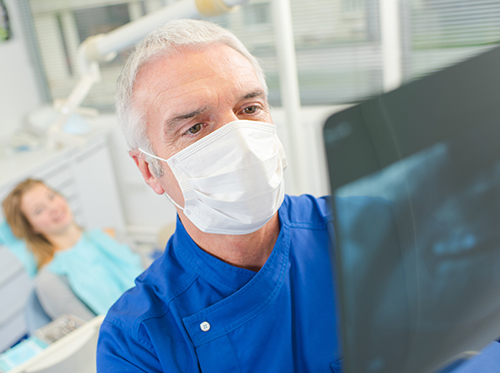October 12th, 2017

You can learn just about anything on the Internet these days. You can also order just about anything on the Internet these days.
But would you order your braces on the Internet? There’s a new trend involving websites that claim to offer a solution for straightening teeth, without your ever seeing a dentist or orthodontist in person.
These companies usually have patients take an impression of their teeth using putty and a tray. Then you mail the impressions back to the company where a dentist reportedly examines them and suggests a course of treatment using 3D modeling software.
A series of clear aligners are made, to be worn by the patient in order to attain the desired result. Although this form of orthodontic treatment may cost less than seeing an orthodontist in person, there are several reasons why you should avoid it:
- Potential health hazards are missed: If your oral health is not up to par (e.g., you have cavities, gingivitis, chipped teeth, etc.), an orthodontist would not suggest orthodontic treatment. Only after these issues are addressed would treatment be considered as an option. Whether this is the case with a person can’t be known when all the doctor sees is a set of impressions.
- Lack of information about the patient: Before you receive any orthodontic treatment, an orthodontist will have X-rays taken to make sure you are a good candidate. If the bones or teeth do not look like they would align properly with treatment, another course of care may be suggested, even necessary. None of this background is available to over-the-net orthodontic providers.
- No regular checkups: The purpose of regular checkups with Dr. Neil Oliveira and Dr. Derek Wolkowicz is to ensure that everything is moving properly, on schedule, and most important, safely. This lack of hands-on care with Internet orthodontics could be a hazard for you as a patient and has the potential to do more harm than good.
It’s not worth the risk of getting orthodontic treatment over the net just to save some money. Our New Bedford or Mattapoisett, MA office is committed to working with you, whatever your financial situation may be.
Let’s work together to give you the smile you deserve!
October 5th, 2017

X-rays have been a function of dental healthcare for a long time. That in and of itself should be good news, because it means we've had plenty of time to improve them. While there is always some risk in exposure to radiation, dental X-ray exposure has decreased significantly due to all the advances in technology. So there’s risk, but X-rays are quite safe.
Think of X-rays as you would about a car. Automobiles these days have all kinds of technology to make them as safe as possible. There's still a chance that you’ll suffer an accident. Would you stop using a car because of that risk? When it comes to dental X-rays, Dr. Neil Oliveira and Dr. Derek Wolkowicz and our team believe the positives clearly outweigh the negatives.
X-rays can be done digitally or with film. For film, X-rays require different exposures at different speeds to produce the image. Digital X-rays have software that automatically adjusts the exposure and produces the X-ray in a digital file. Since they substantially reduce your exposure to radiation, digital X-rays are the current standard in dental offices.
In addition to digital X-rays, lead aprons are an essential piece of X-ray safety. They help protect internal organs from X-rays by acting as a shield. They usually come with a thyroid collar as well, since that is one of the most vulnerable areas to X-rays in the body. Lead aprons can absorb up to 95% of any scatter rays that result from an X-ray. Not bad, right?
Although dental X-rays involve some radiation exposure (not all of it can be eliminated), so does everyday life. Getting too much sun, for example, can be dangerous. The truth is, we accumulate radiation in our bodies over a lifetime, so it’s worthwhile to be aware and avoid as much unnecessary exposure as possible. When it comes to your dental health, though, getting an X-ray — especially when your doctor says you need it — offers more benefits than risks.
Ask us about the type of dental X-rays we use during your next visit to our New Bedford or Mattapoisett, MA office!
September 28th, 2017

A solid oral health routine begins with daily brushing, flossing, and rinsing. Without a consistent oral health regimen, you may begin to experience tooth decay and bacterial infections. Few patients ask Dr. Neil Oliveira and Dr. Derek Wolkowicz about different mouthwash options, so we’ve put together a list of the conditions that mouthwashes can treat. This should help you decide which oral rinse would be best for you.
Gum Health
Antiseptic mouthwashes reduce large amounts of bacteria on and near the gum line and generally help to decrease your chances of developing gingivitis. The key ingredients of antiseptic mouthwashes are antibacterial and antimicrobial items. Antiseptic mouthwash is a preferable option if you are concerned about the general gum health of your mouth.
Fluoride
Fluoride is a great tool for preventive tooth decay treatment. It prevents tooth decay and is great for oral health in general because it kills germs that can live in your mouth. Fluoride also builds stronger teeth. If you’re a bottled water drinker, Dr. Neil Oliveira and Dr. Derek Wolkowicz may recommend that you purchase a simple fluoride rinse to use after brushing.
Bad Breath
Fluoride mouthwash can be used to fight any bad breath issues you may be facing. It’s designed to combat any bacteria that might be building up in your mouth. Most mouthwashes will help eliminate bad breath, but some are specifically designed to address this difficult problem. If you feel as though this might be turning into a chronic problem, please contact Dr. Neil Oliveira and Dr. Derek Wolkowicz to discuss other options that would be effective for treating your symptoms.
American Dental Association (ADA Approval)
The ADA reviews all mouth rinses for safety measures and to prove effectiveness. Any mouthwash approved by the ADA has met strict guidelines according to whether the manufacturer’s claims are supported with scientific evidence. If you’re looking for a quality mouthwash, look for one that has the ADA seal of approval to ensure you have a great rinse for your mouth.
Considerations
When you’re trying to decide which mouthwash to pick, contact our New Bedford or Mattapoisett, MA or ask Dr. Neil Oliveira and Dr. Derek Wolkowicz during your next appointment. If you experience a burning sensation in the soft tissues of your mouth, be sure to discontinue use immediately. Avoid letting children under age six use a mouth rinse, and be sure to keep all mouthwashes out of the reach of children, because they contain alcohol and other substances that could be harmful.
September 21st, 2017

There are so many adults and teens in our New Bedford or Mattapoisett, MA office who would love to have their teeth straightened but that are unwilling to go through the long and unsightly process of traditional metal braces. Well, that's where Invisalign® and Invisalign Teen® come to the rescue; the most advanced clear aligner systems in the world!
There are several reasons why, if you're considering getting braces, you should consider Invisalign too. Here are some of them:
- You can eat whatever food you'd like, without worrying about it getting caught in wires or breaking brackets.
- Most people won't even know you're wearing them!
- If you need to, you can remove your aligners at any time.
- The removable aligners let you brush and floss as you normally would, making for better overall oral health.
- Since they are made of a smooth BPA-free plastic, Invisalign aligners are simply more comfortable to wear than traditional braces. No metal means no more roughed up gums or irritated tongue!
- You'll need to visit our New Bedford or Mattapoisett, MA office less often — only once every six weeks or so.
- With Invisalign Teen, you’ll receive up to six replacements for lost or broken aligners.
Before you get started with treatment, you’ll have a consultation with Dr. Neil Oliveira and Dr. Derek Wolkowicz to see if Invisalign or Invisalign Teen is right for you. If your case is a good fit, then you’ll have X-rays, pictures, and impressions of your teeth taken. That information will be used to make the 3D models of your teeth that let Dr. Neil Oliveira and Dr. Derek Wolkowicz see how they will move throughout the entire treatment and approximately how long it will take.
After that, you’ll receive your aligners based on the treatment plan we recommend. You’ll get a new set of aligners every two weeks. Then all you need to do is wear your aligners 22 hours a day and you’ll be on your way to a straighter healthier smile. Don’t hesitate to a member of our New Bedford or Mattapoisett, MA team for more information about Invisalign!




